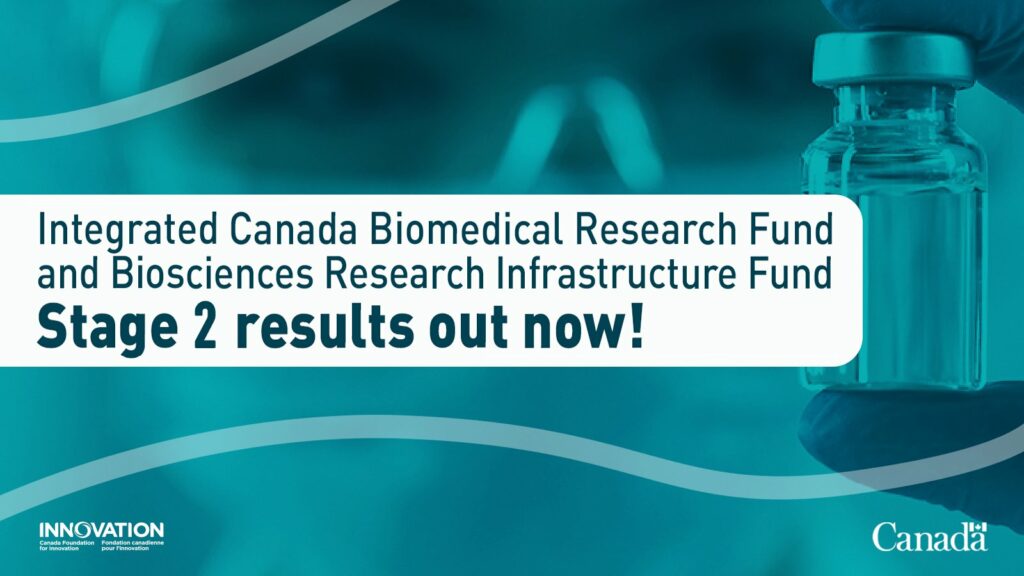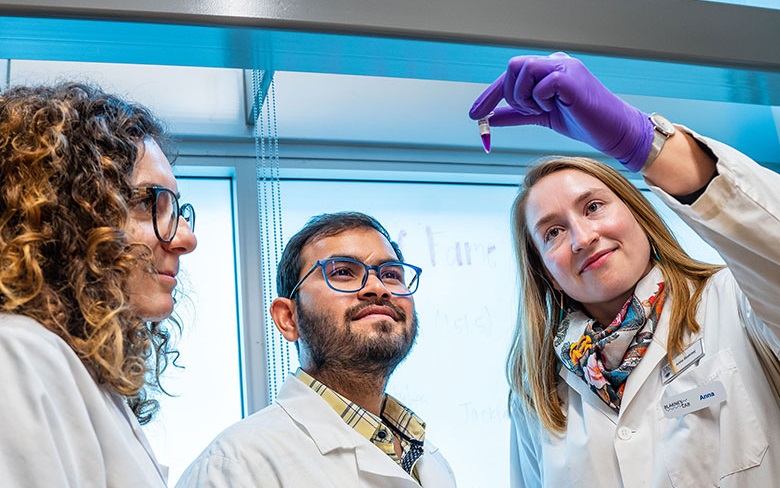
On 6 May 2024, the Government of Canada announced Stage 2 of its integrated Canada Biomedical Research Fund (CBRF) and Biosciences Research Infrastructure Fund (BRIF) investments in the amount of $574 million for 19 projects at 14 research institutions across Canada. These investments, channelled through five national research hubs—located at The University of British Columbia, University of Alberta, University of Toronto, University of Ottawa, and Université de Montréal—aim to prepare Canada for future health emergencies by building capacity.
NMIN is a partner organization, and NMIN researchers and NMIN Core Facilities play significant roles, in two of these hubs: Canada’s Immuno-Engineering and Biomanufacturing Hub (CIEBH) at The University of British Columbia and the Canadian Hub for Health Intelligence and Innovation in Infectious Diseases (HI3) at the University of Toronto.

Dr. Anna Blakney (R) and other NMIN researchers play key roles in Canada’s Immuno-Engineering and Biomanufacturing Hub (CIEBH) at UBC
Canada’s Immuno-Engineering and Biomanufacturing Hub (CIEBH)
CIEBH received $140 million for four projects. In three of these projects, NMIN researchers and NMIN core facilities play key roles:
The project AVENGER: Advanced LNP RNA Vaccines Engineered with Next-Generation designs to Enhance pandemic Readiness is co-directed by NMIN’s Founding Scientific Director Dr. Pieter Cullis and NMIN research leader Dr. Anna Blakney. Team members include NMIN researchers Drs Ken Harder and Fabio Rossi, and the capacities of NMIN’s NanoCore Core facility are fully integrated into the project. AVENGER aims to be Canada’s LNP RNA vaccine platform by developing a library of optimized LNP formulations designed to generate long-lasting immunity to viruses or antimicrobial resistant bacteria.
The project Advanced Therapeutics Manufacturing Facility (ATMF) includes as team members NMIN researchers Drs Anna Blakney, Pieter Cullis and Eric Jan. A state-of-the-art, good manufacturing practice (GMP) facility, the ATMF will enable production of therapies with high potential to solve current and future health challenges, specifically mRNA vaccines, viral vectors and cell and gene therapies.
The project PROGENITER: Pathogen Response Optimization by GENeratIng ThErapeutics Rationally includes as team members NMIN researchers Drs Anna Blakney, Eric Jan, Shyh-Dar Li and Larry Lynd. PROGENITOR will provide a suite of capabilities and state-of-the-art infrastructure to enable the rapid design, engineering, and production of antibody leads against present and future viral diseases to advance at least three antibodies into Investigational New Drug-enabling studies within four years. Among the capabilities provided will be the expertise of NMIN’s eHTA Core Facility.
“Coinciding closely with the conclusion of NMIN, this investment is timely,” says Dr. Blakney. “It will allow us to continue and to amplify our work in these critical areas, to the benefit of the Canadian health and life sciences ecosystems.”
“There are many reasons for me to be proud of having helped launch NMIN,” add Dr. Cullis, “but certainly one of them is the fact that NMIN infrastructure, specifically its Core Facilities NanoCore and the eHTA—are providing an enormous boost in capacity and capability to these important initiatives, initiatives that are much needed to bolster Canada’s health security.”

Dr. Gilbert Walker (R) with Drs Darius Rackus & Molly Shoichet co-lead BioHubNet as part of the Canadian Hub for Health Intelligence and Innovation in Infectious Diseases (HI3) at UofT
Canadian Hub for Health Intelligence and Innovation in Infectious Diseases (HI3)
HI3 received $72 million to support four research programs, one of them being the Biomanufacturing Hub Network (BioHubNet), an immersive talent development program led by NMIN’s Scientific Director Dr. Gilbert Walker, together with NMIN researcher Dr. Molly Shoichet and Dr. Darius Rackus (Toronto Metropolitan University). BioHubNet has been granted $18.9 million to address the severe shortage of industry-ready highly qualified personnel (HQP) in the biomanufacturing sector over the next four years.
Leveraging many of the learnings and capacity-building approaches and partnerships developed by NMIN research leaders, BioHubNet will provide critical, cutting-edge, hands-on training to graduate students, postdoctoral fellows and others who are ready to transition to industry. According to a 2021 national report from BioTalent Canada, the country’s biomanufacturing sector is predicted to face severe workforce shortages in the coming years.
“This invaluable program is central to the future success and stability of Canadian biomanufacturing,” comments Dr. Walker. “I see it as building upon the tremendous investment already made by NMIN in the next generation of professionals in the field, and I intend to strengthen BioHubNet by bringing into it the lessons learned and best practices of NMIN’s HQP Programming.”
According to the Government of Canada, these CBRF-BRIF investments are aimed at “growing a robust, competitive, domestic biomanufacturing and life sciences sector ensures that Canada has access to critical vaccines, therapeutics and other life-saving medicines.” This round of investment is part of the government’s Biomanufacturing and Life Sciences Strategy, launched in 2021 with a $2.2 billion commitment to develop cutting-edge biomanufacturing capabilities.
Details of all the 19 projects supported by CBRF-BRIF through the 5 national hubs are available here.